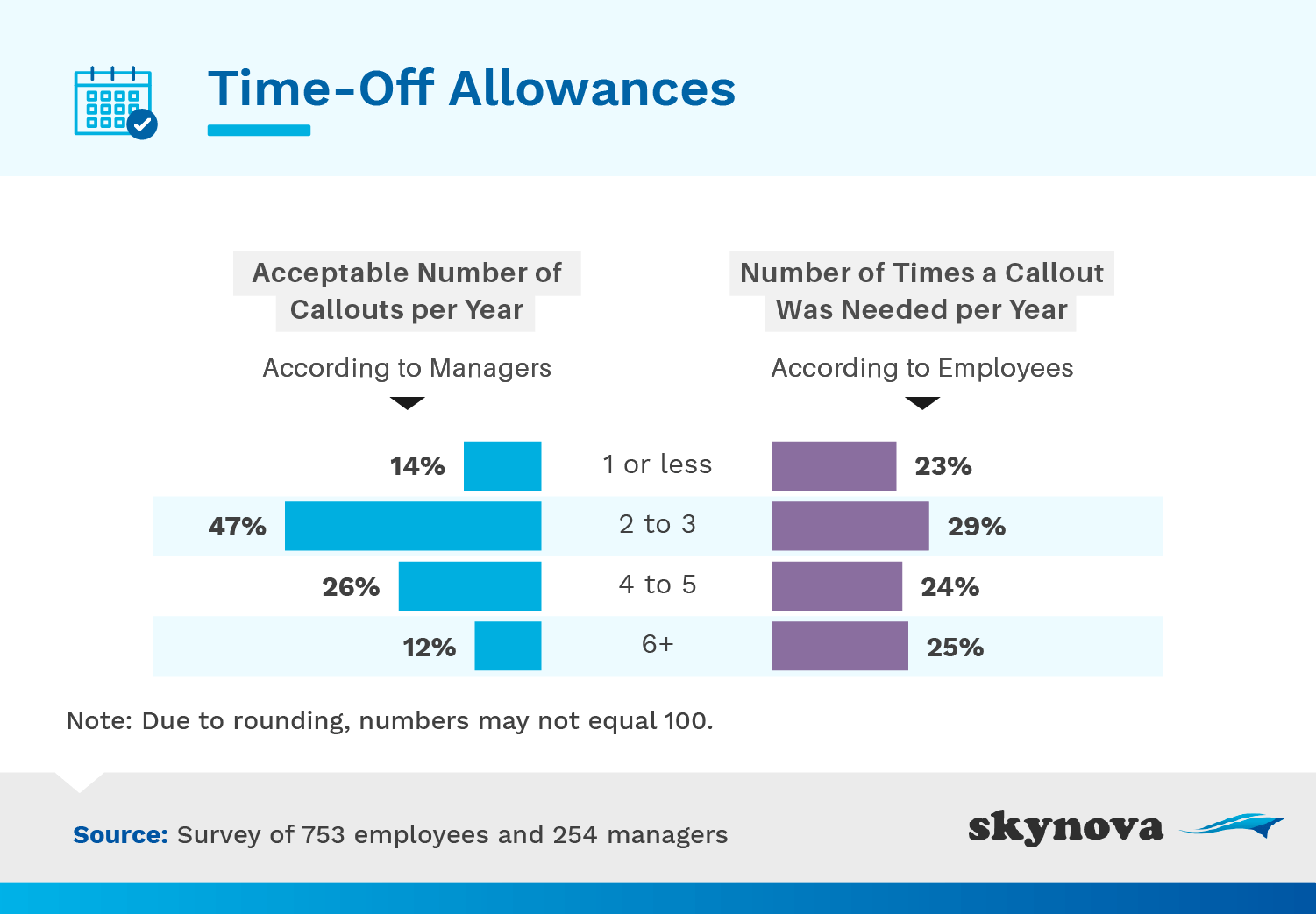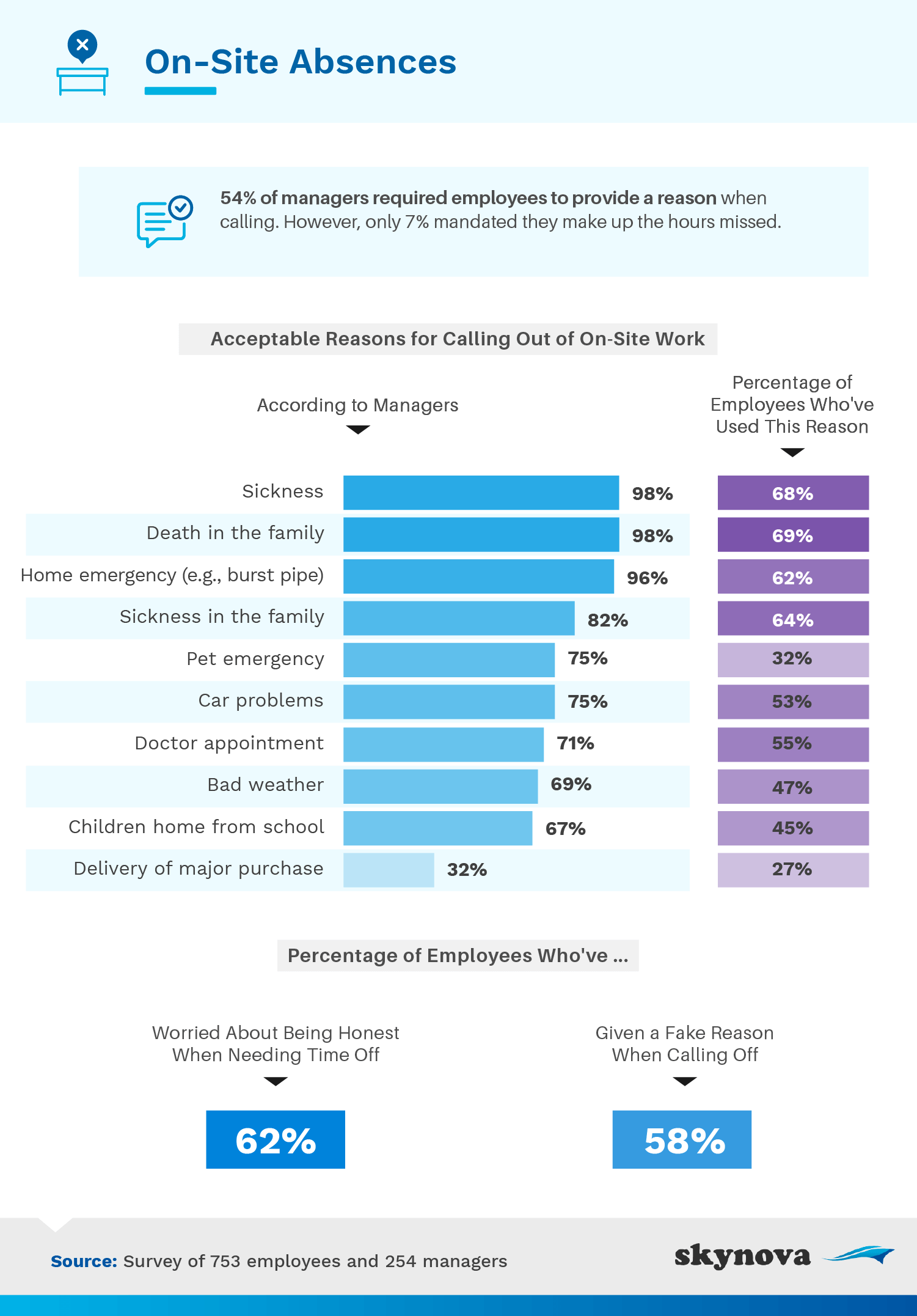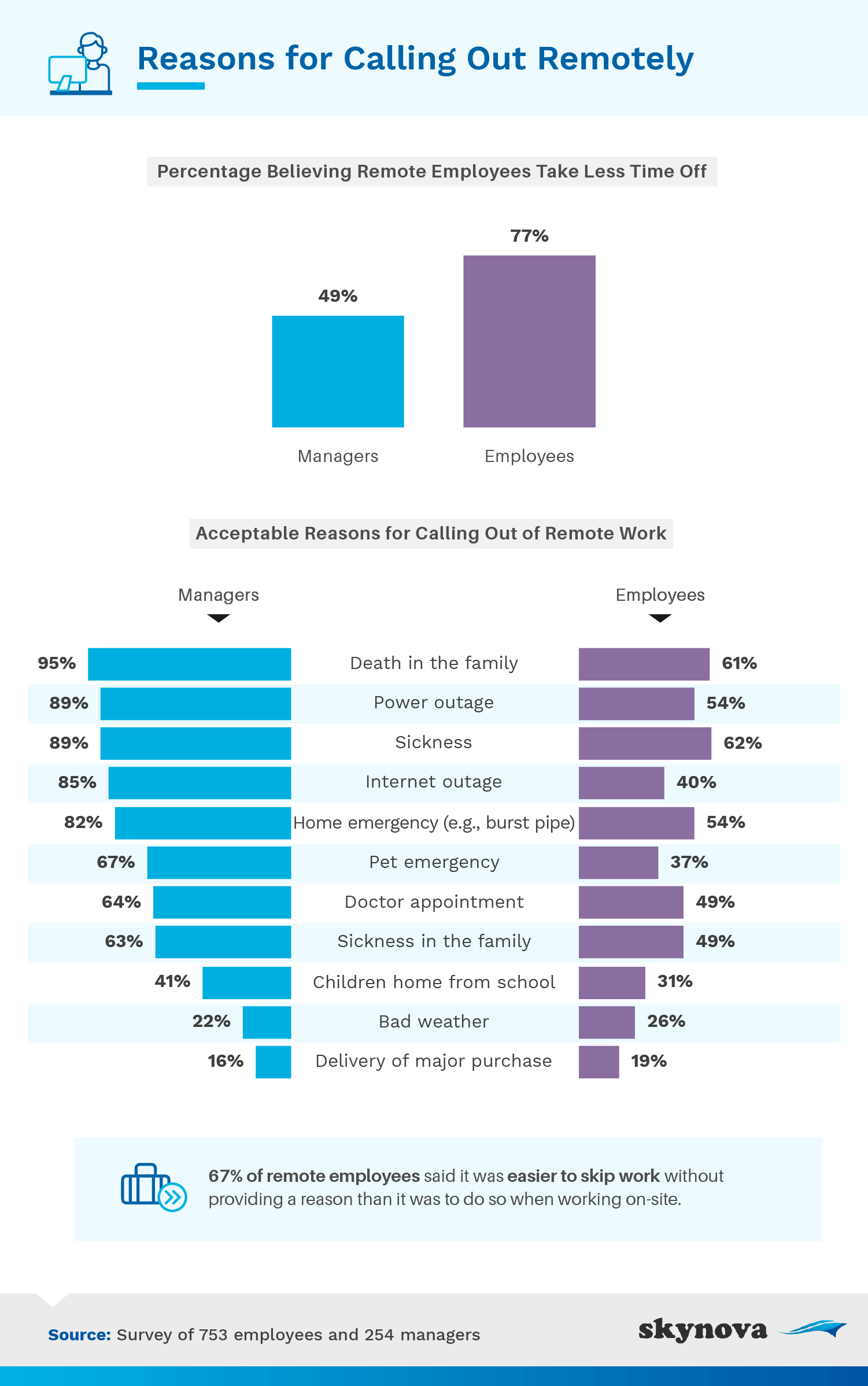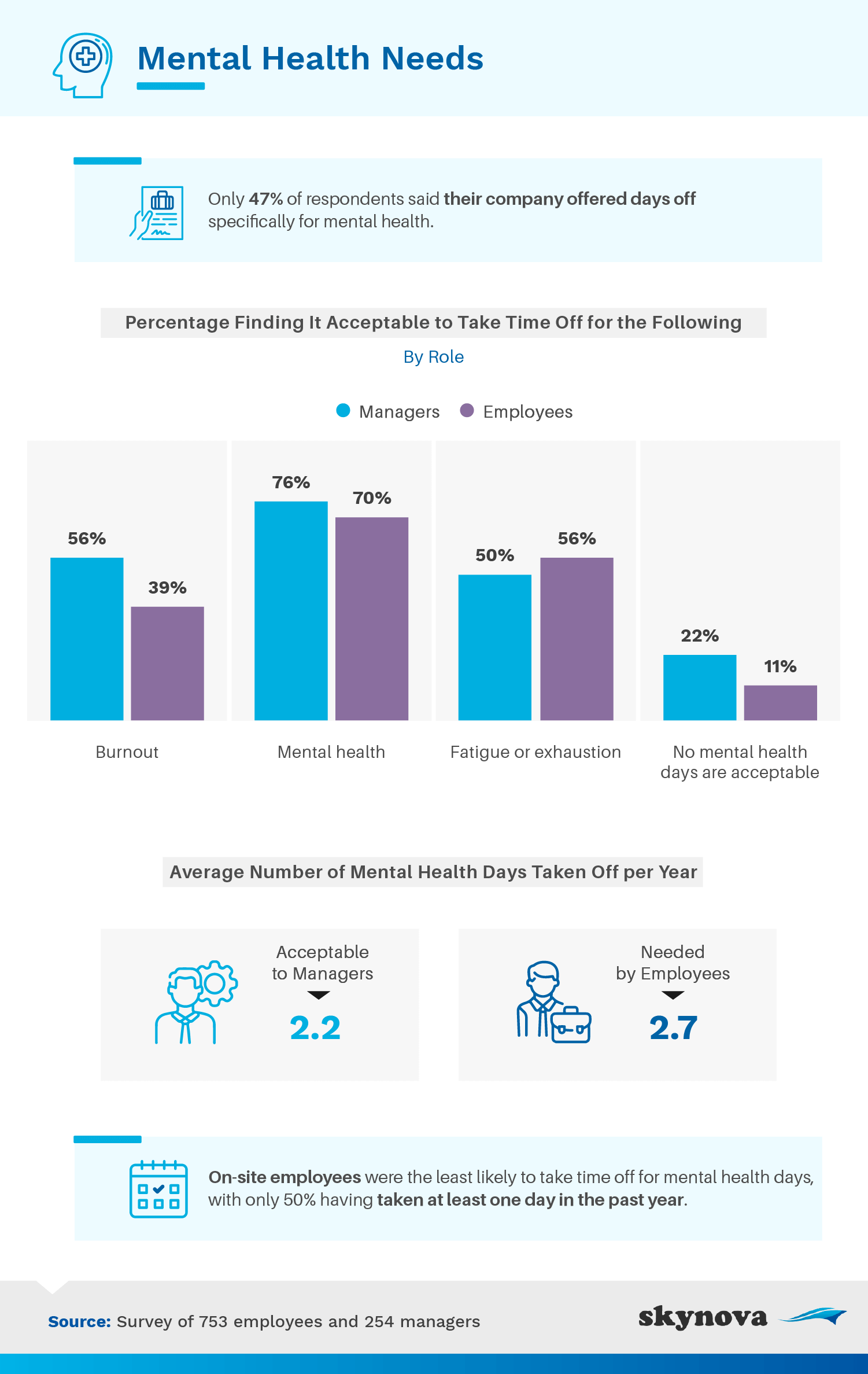
|
In some ways, employees have more reasons to miss work than ever before. Illness, caring for sick family members, children home from school, and sheer mental exhaustion have all become more common over the past two years of living through a pandemic. However, an increase in the prevalence of remote employment has changed not only how people work but also when they choose to skip work.
Calling out of work with limited notice can cause problems for employers; however, the ability to do so sometimes is also part of having a good work-life balance. We wanted a better understanding of when employees are calling out of work; how managers perceive these requests; and how these requests differ based on whether an employee works on-site, remotely, or both. To achieve this, we surveyed 753 employees and 254 managers about their experience taking impromptu time off over the past few years.
From the beginning, there were discrepancies between managers’ expectations and employees’ needs. To start the study, we asked how often workers were having to miss work without providing prior notice—and how often managers felt it was acceptable to do so.

The majority of employers felt it was most acceptable for an employee to call out - without notice - between two and three times a year. However, nearly half of employees reported needing to take more than three days off.
Additionally, respondents were asked about their preferred method for communicating about last-minute time off. A phone call was the go-to method for everyone. But in the event that a phone call could not be made, employees chose to send an email, while employers preferred a text.
In our survey, several managers expressed that the acceptable number of days missed depended on the reason behind the absence. We wanted to see which reasons were deemed sufficient and how often employees used these reasons, starting specifically with on-site workers.

Managers were fairly accepting of most events that might cause an employee to miss work. All but one reason (delivery of a major package) garnered the support of at least half of the managers surveyed. But employees didn’t expect their managers to be so forgiving. Sixty-two percent said they had worried about telling their manager the real reason they needed off, while 58% said they had lied about why they weren’t able to work. Not all managers were willing to turn a blind eye to this deception: 29% said they had called an employee out for providing a fake excuse.
Employees also have more to worry about than an intolerant manager when deciding whether or not to call out. For those paid hourly, missing work means missing out on money. Even at the height of the omicron COVID-19 variant, some workers failed to call out when they were ill because they did not have paid sick leave and could not afford the cut in their paycheck.
Previously, not going to work likely meant staying at home. But now, for some, going to work and not going to work both involve being at home. We asked hiring managers and employees working remotely how constantly being at home changed their perception of taking time off at the last minute.

Remote employees were significantly less likely than managers to view most reasons for calling out as acceptable—and, in most cases, less so than their on-site peers too. This is emblematic of a larger trend in which remote workers are working longer hours than they did in the office with more reporting weekend work as well. Furthermore, many remote employees have developed an aversion to calling out sick. Traditionally, one of the main reasons people would avoid coming into the office when sick was to avoid spreading illnesses to their co-workers. Working from home has eliminated that risk, and therefore, people are more likely to continue working through a sickness.
But not all remote employees were overworking themselves. Sixty-seven percent said that it was easier for them to skip work without an excuse now than it was when they worked in the office.
With remote employees showing such limited support for most reasons to call out of work, it’s likely they are putting in more hours than their on-site counterparts. But the group taking the fewest days off are probably hybrid workers.

While 68% of on-site workers had used illness as an excuse to miss work and 62% of remote workers felt it was acceptable to do so, only 53% of hybrid workers said they would call out of work when sick. The pressure to simply work from home instead of taking the day off completely is just one of the reasons why hybrid work appears to be the most draining on employees.
After analyzing a variety of reasons why employees miss different types of work, we concluded our study by focusing on one divisive reason: mental health.

Mental health is becoming an increasingly crucial facet of maintaining a positive company culture, but some companies have been slow on the uptake. Less than half of respondents said their company offered days off specifically for mental health. Employees and managers also had mixed thoughts when it came to determining what types of mental health days were acceptable. Again, despite a high level of acceptance from managers, 60% of employees expressed trepidation when asking for a mental health day.
Work type clearly affected how comfortable employees felt asking for time off for this reason. Those who worked on-site were the least likely to take mental health days with only half having taken at least one day in the past year. Meanwhile, 75% of remote workers had taken at least one day as had 82% of hybrid employees. Generational differences existed as well. Younger respondents were more likely to take mental health days with 76% of millennials taking at least one, compared to 67% of Gen Xers and only 50% of baby boomers.
Overall, we found that there were some notable differences between managers and employees on the subject of calling out of work. When it came to the number of times acceptable to request last-minute time off, managers were more strict—but when it came to reasons for calling out of work, they were often more understanding than employees themselves.
We also found that work type had a distinct impact on how comfortable employees felt when calling out. Compared to other work styles, those working in the office felt more at ease calling out for most reasons. The major exception, however, was mental health days. In this case, on-site employees were the least likely to take time off, compared to both their hybrid and remote counterparts.
Handling last minute requests for time off can be unpredictable and time-consuming — so don’t let invoicing take up your energy as well. Skynova’s innovative invoicing software can help you and your small business focus on what is important. Additionally, we enjoy writing about business and workplace topics, such as securing time off. The research for these articles comprises both primary and secondary sources.
We surveyed a total of 1,007 people, including 254 managers and 753 employees. Of the employees, 64 were baby boomers, 215 were Gen Xers, 419 were millennials, and 55 were Gen Zers. Additionally, 455 were men, 293 were women, and five preferred not to say. For managers, there were 20 baby boomers, 96 Gen Xers, 130 millennials, and 8 Gen Zers. There were 156 men, 97 women, and one that preferred not to answer. To ensure respondents took our survey seriously, they were required to answer an attention-check question. Data also rely on self-reporting, limitations of which include exaggeration, selective memory, and telescoping.
If you think your readers would be interested in our study, please feel free to share this information. We just ask that you do so for noncommercial purposes only and that you link back to this article.